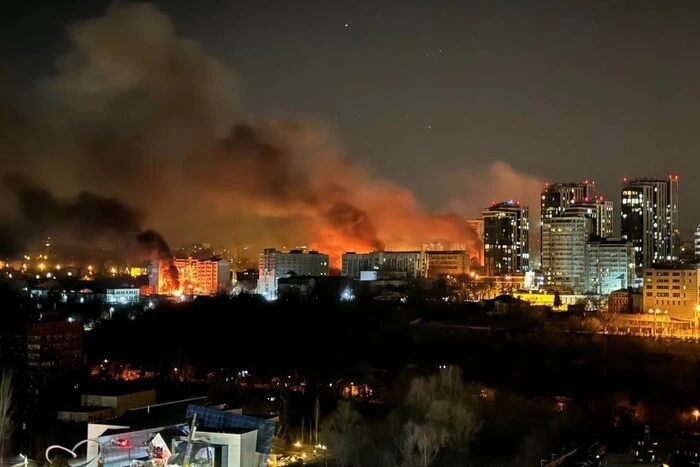Russia attacks Kharkiv and Dnipro with drones: main points of the night.


Strikes on Dnipro
On the evening of March 26, Russia attacked Dnipro with drones. As a result of the attack, fires broke out in the city. This was reported by Glavkom, citing the head of the Dnipropetrovsk OVA, Serhiy Lysak.
Local public pages report that a series of explosions occurred in Dnipro, after which fires began. According to preliminary data, the strike hit the city center. It is known that civilian buildings were damaged.
Due to the drone attack in Dnipro, several fires broke out. Vehicles and infrastructure facilities were set on fire. All services are working. It is being clarified whether there are any casualties.
Strikes on Kharkiv
The occupiers struck Kharkiv with drones. As a result of the strikes, there are casualties, including children. This was reported by Kharkiv Mayor Ihor Terekhov and the head of the Kharkiv ODA, Oleg Synehubov, as informed by Glavkom.
Kharkiv Mayor Ihor Terekhov reports that the enemy struck Kharkiv with their military drones at least 12 times.
Terekhov added that residential buildings, vehicles, and utility structures were damaged. All relevant services are already engaged in eliminating the aftermath of the shelling in Kharkiv.
Scandalous correspondence in Signal
Journalists from The Atlantic have published screenshots of a secret chat in the messenger Signal, where representatives of the administration of former President Donald Trump discussed military operations against the Houthis. It turned out that National Security Advisor Mike Waltz accidentally added a journalist to this chat. This was reported by Glavkom, citing The Atlantic.
According to the publication, U.S. Secretary of Defense Pete Hegseth shared information in this chat about military aircraft flights and upcoming strikes on Yemen two hours before the start of U.S. strikes against the Houthis on March 15. The Atlantic emphasizes that such a leak of information could pose a threat to the safety of U.S. military personnel and pilots.
Secretary of Defense Pete Hegseth commented on the situation on social media, stating that the military plans published by The Atlantic contain no personal data, coordinates, targets, routes, or other confidential information.
At the same Time, Secretary of State Marco Rubio commented on the scandal related to the correspondence in Signal, acknowledging that a serious mistake had occurred. According to him, the journalist from The Atlantic was mistakenly added to a group chat created for coordinating actions among high-ranking U.S. national security officials.
Agreement on minerals
The U.S. has prepared a ready-made version of the agreement on minerals for Ukraine, and its signing may take place next week. This was stated by U.S. Secretary of the Treasury Scott Bessent on Fox News, as reported by Glavkom.
We have provided Ukraine with a ready document on economic partnership. It is currently being reviewed by the Ukrainian side, and we hope that full discussions will begin next week and the agreement may be signed, Bessent said.
According to Bessent, the initial draft of the document planned to be signed at the end of February had only four pages. But Washington decided to use this time to finalize the agreement and bring it to completion.
Auto tariffs
U.S. President Donald Trump announced a 25% tariff on all cars imported into the United States. However, this rule will not apply to vehicles produced in the U.S. This was reported by Glavkom, citing NBC News.
Trump expects automakers to build new plants or expand existing ones in the U.S. to avoid paying the tariff.
Following this announcement, shares of leading U.S. automakers sharply fell in after-hours trading: Ford Motor shares fell by 2%, General Motors by 2.3%, and shares of Stellantis, the owner of the Jeep brand, dropped by 3%.
Read also
- The USA has voted to extend military aid to Ukraine
- NATO Calls for Preparation for War with Russia and China









